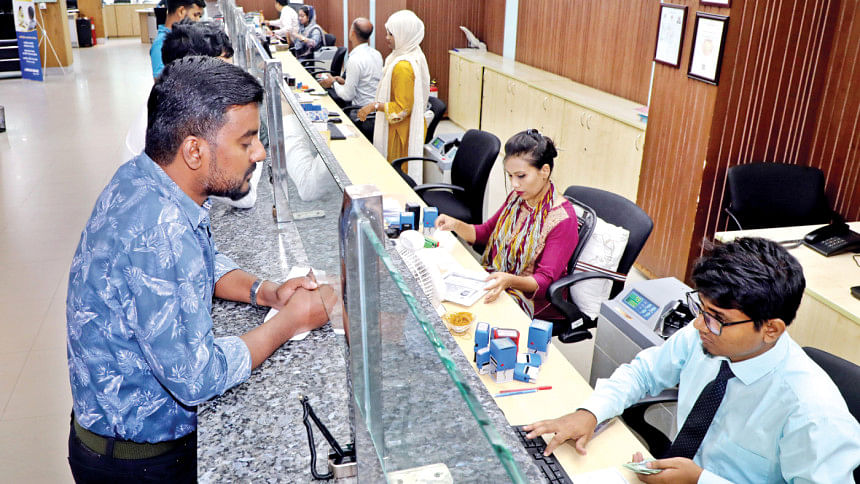Saving Wise, Building Strong

At a busy branch on Green Road, Lipi Monowar opens a school banking account for her young son—a small but significant step in securing his financial future. "There is no alternative to saving,"
she says, reflecting a mindset that Bangladesh's financial sector is increasingly eager to promote.
Savings, long regarded as a cornerstone of personal financial security, are equally critical to the health of a nation's economy. In Bangladesh, banks are stepping up efforts to attract savers by offering an expanding range of products—from fixed deposits to goal-based savings schemes. As custodians of public deposits, banks not only help individuals build financial resilience but also underpin broader economic stability by channelling savings into investment and development activities.
"Savings are a fundamental driver of national development and GDP growth. A nation's economic activities are largely sustained by savings, with national expenditures funded through both government and private channels. In Bangladesh, however, government savings lag behind private savings. As a result, a significant portion of government financing is sourced from private savings. Banks, as the main custodians of these funds, have struggled with poor management for over a decade, undermining public confidence. Private savings have also been adversely impacted—exacerbated by the central bank's move to cap interest rates at 9 percent for lending and 6 percent for deposits," says Rushad Faridi, Assistant Professor at the Department of Economics, University of Dhaka.
He suggests that the government and banks should ensure trust and transparency regarding the use of private savings, so that people feel more encouraged to save, ultimately benefiting both individuals and the national economy.
Experts say banks remain the safest option for individual savings, warning that keeping money in informal channels often results in significant losses. Savings are not idle funds; they are future investments. In times of financial distress, access to formal banking systems can serve as a crucial lifeline, providing stability when it is needed most.
Md. Arup Haider, Deputy Managing Director and Head of Retail Banking at City Bank, says that scheduled commercial banks remain the safest place to keep one's savings. "Some may argue that a few banks are currently struggling to honour cheques immediately, but this is a temporary issue. No bank has outright denied returning customers' money. These delays are mostly due to short-term liquidity problems or mismanagement linked to non-performing loans (NPLs), which are being addressed under the supervision of the central bank," he explains.
According to the latest Bangladesh Bank annual report, private commercial banks hold the largest share of deposits, amounting to BDT 15,688.3 billion, 67.1%, followed by state-owned commercial banks with BDT 5600.7 billion, 25.4%.

Banks offer a wide range of popular savings schemes, including Fixed Deposits (FD), Monthly Savings Schemes (MSS), Double or Triple Benefit Deposit Schemes, Pension and Retirement Savings Plans, Special Savings Schemes for Women, Islamic Savings Schemes, children's and student savings accounts, as well as government savings instruments such as various types of Shanchaya Patras.
As of 31 December 2024, Fixed Deposits (FDs) received the highest response among all account types, with 7,196,882 accounts holding a total of BDT 87,529,932 lakh—representing 46.47% of the total deposit amount. Savings deposits ranked second, with 127,355,768 accounts holding BDT 38,576,429 lakh, accounting for 20.48% of the total amount.
Banks are ramping up savings schemes to encourage smarter financial habits, with individual deposits forming a key pillar of Bangladesh's macroeconomic stability.
"At UCB, we are witnessing sustained interest in savings among our customers. Despite economic fluctuations, public trust in our bank remains strong. Our deposit portfolio continues to grow, fuelled by both individuals and institutions. Customers are shifting from basic transactional accounts to more structured, goal-based savings plans," says Mohammad Mamdudur Rashid, Managing Director & CEO, United Commercial Bank.
The growing financial independence of women and their increasing participation in economic activities are reflected in their savings patterns. At the same time, it is encouraging to see that the younger generation is also developing a habit of saving.
"What we're seeing at City Bank is a steady rise in the share of deposits from women," says Arup Haider. "Five years ago, female customers made up 22 percent of our retail deposits; now, that share has grown to 30 percent. At the same time, younger customers are also saving, often with short-term goals in mind—like purchasing a mobile phone."
Bank Asia currently maintains approximately 8.7 million savings accounts, with a total balance of BDT 432,442 million.
"To attract more customer savings while meeting expectations around safety, trust, and profitability, Bank Asia PLC has launched segmented products such as youth savings accounts, women-centric accounts, and senior citizen deposit schemes with attractive benefits," says Shaminoor Rahman, Head of SMR at Bank Asia Ltd. "We have also expanded our Mudaraba-based savings and term deposit options for our Islamic banking clients, ensuring full transparency in profit calculation."
Banks are introducing new types of savings schemes and receiving positive responses alongside their regular offerings.
"A phenomenal deposit growth we've seen is from our Senior Citizen Programme. We launched a special deposit scheme for them at the end of 2023, and within a year it has already crossed Tk 1,000 crore," states Mohammad Ali, Managing Director & CEO of Pubali Bank.
Banks are increasingly encouraging customers to open and maintain savings programmes through digital platforms to promote cashless transactions across all services. Customers, in turn, are responding positively, finding the process more convenient and accessible.
Shariah-based banks are gaining significant traction among customers seeking secure savings options aligned with Islamic banking principles, thanks to their diverse range of savings schemes.
Mohammad Rafiqul Islam, Executive Vice President & Head of Retail Banking Division, Al-Arafah Islami Bank PLC, says, "What truly sets our savings products apart is their Shariah-compliant structure, which appeals strongly to customers seeking ethical and principled banking. In addition, we offer Shariah-compliant competitive profit and flexible deposit options designed to suit a wide range of financial goals—from short-term liquidity needs to long-term wealth accumulation. We have Internet Banking, Islamic Wallet, and AIBPLC App to access the account 24/7."
He also adds that Al-Arafah Bank, as of 2025, managed a deposit base exceeding BDT 52,000 crore, serving over 36 lakh customers across the country.
"At Midland Bank, we've observed a significant rise in customers opening savings accounts and schemes digitally through our Midland Online platform," says Md Rashed Akter, Head of Retail Distribution Division and Chief Bancassurance Officer (CBO) of Midland Bank PLC. "Digital users always receive an additional 2.5 percent interest compared to those using physical channels for savings schemes. This has led to strong growth in digital savings."
He added, "Our Super Saver Account has become the most popular savings scheme, and this year, we introduced a new feature—Super Saver Plus—which offers customers up to 7.5 percent interest across various types of savings schemes."
According to him, these initiatives are designed to foster a savings-oriented mindset among customers, encouraging them to keep their money within the banking system, which is secure and accessible whenever needed.
Banks are increasingly targeting untapped segments of the population to bring them into the formal banking system. For instance, Al-Mamun Ansar, Head of Liability Business, Liability & Wealth Management at Eastern Bank Limited (EBL), states, "At EBL, we are planning to bring non-resident Bangladeshis (NRBs) into the banking network. We have proposed a collaboration with the Bureau of Manpower, Employment and Training (BMET) to allow prospective migrants to open bank accounts before going abroad. This would enable them to carry out transactions via an app-based banking system, ensuring their remittances are routed through formal channels and helping them save more effectively."
He further added that EBL is currently seeing strong demand for its deposit pension schemes (DPS), particularly the EBL Confidence and EBL Millionaire plans, which cater to both short- and long-term savers. These schemes also feature women-focused versions, aimed at promoting greater financial inclusion among female customers.
In addition, with recent developments, banks—partnering with MFS providers—are offering digital deposit products through mobile wallets, enabling customers to make small, convenient deposits. This initiative helps individuals secure their financial futures and holds significant potential to boost the national economy.

 For all latest news, follow The Daily Star's Google News channel.
For all latest news, follow The Daily Star's Google News channel. 




Comments